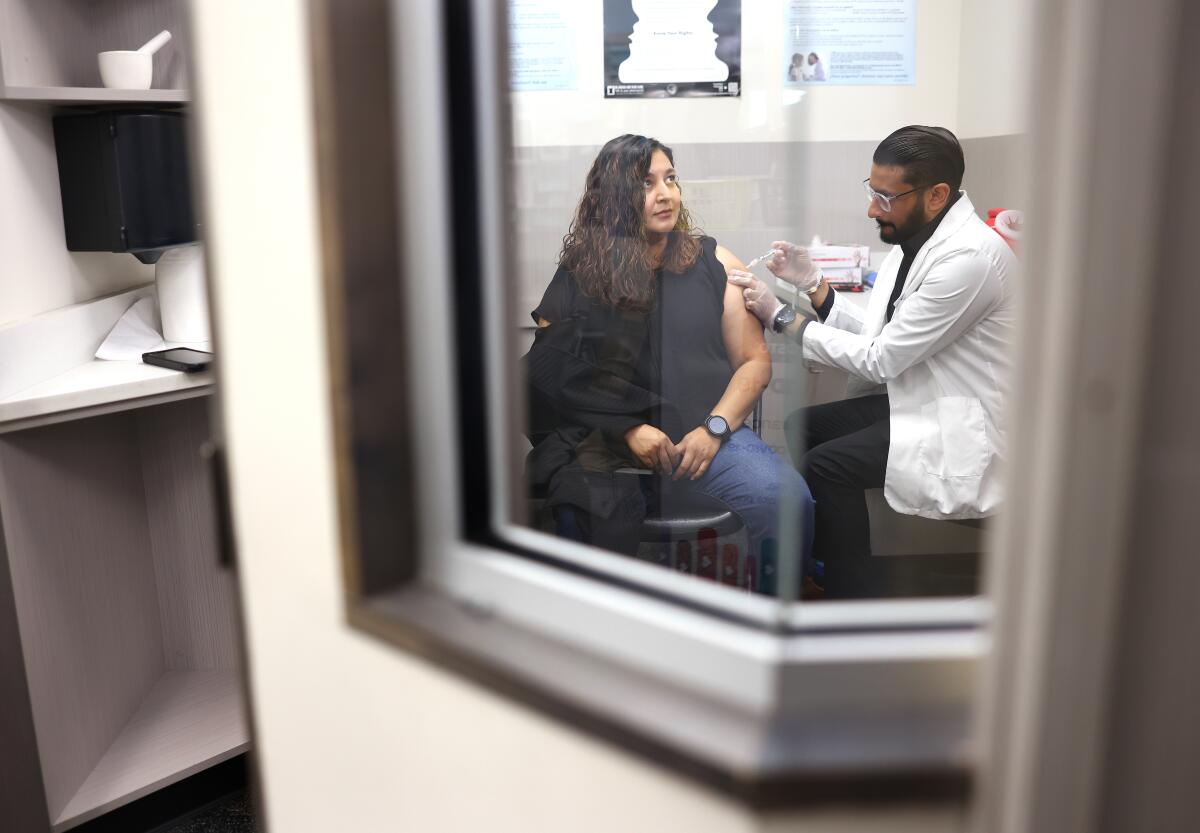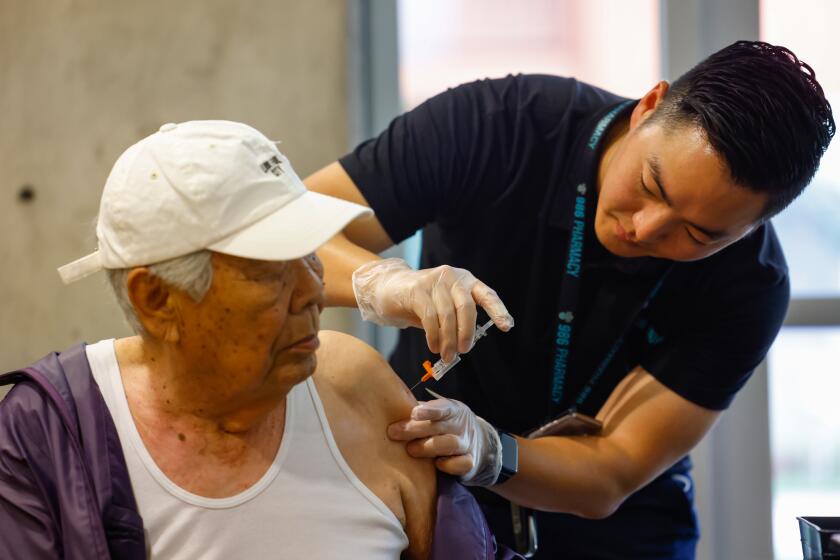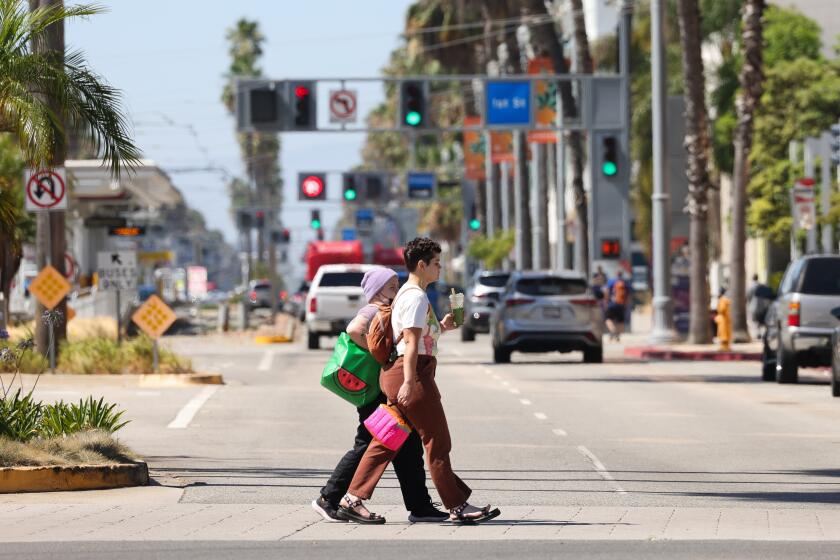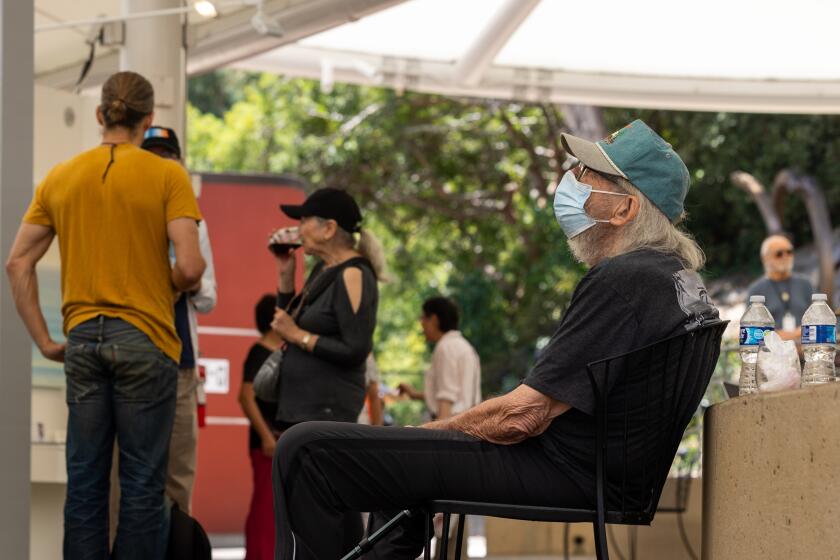The new COVID vaccine is here. Why these are the best times to get immunized

- Share via
With the new COVID-19 vaccinations for the 2024–25 season arriving in California and across the nation, an important question arises: When is the best time to get the shot?
The U.S. Centers for Disease Control and Prevention says September and October are generally the best times for most people to get the COVID immunization.
But which month is better for your particular situation? Should you rush to get the shot now, considering the high levels of COVID circulating in California? Or should you wait till closer to Halloween in hopes that doing so will extend more robust protection against infection through Christmas and into the New Year?
And what about people who got infected recently or got the old immunization formula a couple of months ago?
Providers in California began administering COVID-19 immunizations using the latest formulation this week. Appointments are available at CVS, Walgreens, Rite Aid, Ralphs, Vons, Albertsons, Pavilions and Safeway stores. Kaiser Permanente expects to begin making vaccines available by mid-September and possibly earlier in some locations. Sutter Health is also aiming for a mid-September rollout.
The CDC recommends that everyone 6 months old and older get the updated COVID-19 vaccination, which was authorized for distribution by the U.S. Food and Drug Administration last week.
The updated COVID-19 vaccine could be available any day, a promising development for California and the nation amid a potent and enduring summer wave of the disease.
Here are some factors to consider:
The case for October
The head of the CDC suggested that the most important decision is not when to get the vaccination, but just getting it.
“The important part is getting it done,” CDC Director Dr. Mandy Cohen said at a briefing. “If September, from a calendar perspective, works better for folks, great. October gets you closer to the winter season. But the important part is getting it done.”
Dr. Peter Chin-Hong, a UC San Francisco infectious disease expert, makes the case for an October dose.
Getting the COVID-19 vaccine now or in October will offer good protection against severe disease for at least a year, he said. But the best protection against infection is roughly within six to eight weeks after getting vaccinated — although that window can be wider if the vaccine is a close match to circulating subvariants, Chin-Hong said.
“To me, the sweet spot is always October,” he said, as it’s closer to the peak of the late fall and winter respiratory virus season, as well as major holidays like Thanksgiving, Christmas and New Year’s. Based on wastewater data during the last two winters, COVID peaked in California and nationally either the last week of December or the first week of January.
California’s FLiRT-fueled COVID surge is continuing to spawn infections at a dizzying rate, with coronavirus levels in wastewater reaching some of the highest levels seen since 2022.
The case for September
But Dr. Elizabeth Hudson, regional chief of infectious diseases for Kaiser Permanente Southern California, suggested that people get the vaccine as soon as they can.
“The way that COVID is looking now — with just the sheer volume of cases — this is not a year that you want to wait,” Hudson said. “As soon as you are able to get the vaccine, you should get it.”
COVID-19 continues to circulate at a very high level nationally and in California. Depending on the region, health officials are “potentially seeing some indication of a plateauing of the summer increase in COVID-19,” said Dr. Demetre Daskalakis, who heads the CDC’s National Center for Immunization and Respiratory Diseases. Still, “we’re not out of the woods yet,” he added. Trends won’t be clear until there are a few weeks of sustained declines, and that hasn’t happened yet.
Not only is the hyperinfectious KP.3.1.1 subvariant gaining dominance nationwide, doctors also are closely watching a new upstart subvariant, XEC, that has been getting attention in Europe.
Dr. Peter Marks, the FDA’s vaccine chief, said in an Aug. 23 briefing that he has scheduled his vaccine appointment.
“Getting vaccinated now probably gives you the maximum amount of protection that you can get against what’s currently circulating, and that will last for several months, at least,” he said.
What about seniors and immunocompromised people?
Chin-Hong said there are certain people he would urge to get the COVID-19 vaccination as soon as possible. That includes those who are older or immunocompromised and haven’t been vaccinated in more than a year. Those groups are at highest risk for being hospitalized with COVID, Chin-Hong said.
“I would love them to get protected,” he said.
Dr. Eric Topol, director of the Scripps Research Translational Institute in San Diego, offered some questions people should ask themselves to determine whether they should get vaccinated now versus in October.
“How long has it been since you had a booster? If it’s been more than six months, you know your immunity has waned,” Topol said. “How is your risk? Are you older — greater than 65? Are you immunocompromised? Are you somebody with a lot of comorbidities? You might want to just go now [if so], because you’re vulnerable.”
“For people at risk, I don’t think it’s a good idea to delay,” Topol said.
Another question: Are you getting vaccinated to reduce your chance of long COVID? “Because the studies in totality suggest up to a 50% reduction of long COVID” following vaccination, he said. “In fact, that’s people in their 30s and 40s that are at the highest risk for long COVID after a mild infection, and a lot of people tend to forget that issue.”
Another consideration is whether you are about to go on a trip or planning an unmissable event or experience.
“Right now, if they want to prevent infection, it’s a good time to get something because it’s so closely matched to what’s going around,” Chin-Hong said of the new vaccine.
But if you’re doing lower-risk activities now and would rather save your time of enhanced protection against infection for the late fall and winter holidays, some doctors say it’s reasonable to wait until October to get vaccinated.
Already, it appears that XEC, the new subvariant detected in Europe, may be a contender for a late autumn and winter COVID wave, Topol said.
“Waiting a couple extra months so you’re closer to whatever the next wave/wavelet is like, that’s a reasonable plan,” Topol said.
Topol said he got his COVID-19 vaccination Friday, in part because he’s going on a cross-country trip and he’ll be indoors with crowds and unable to avoid exposure to the virus, he said.
Masking remains important to avoid infection, but there are some situations where people may not be able to wear a mask all the time.
Overall, though, there isn’t any one simple answer as to whether September or October is better for timing your COVID vaccination. “It’s really up to the person,” Topol said.
California’s summer COVID surge has proved to be particularly strong and enduring, as it storms to levels not seen in summertime in over two years.
What about people who had COVID-19 recently?
After infection, people may consider waiting three months to get the latest COVID vaccination, according to the CDC. In terms of when to start counting the three-month period, Hudson said a good rule of thumb would be from when your symptoms began or, if asymptomatic, when you were diagnosed.
Part of that reason, the CDC says, is that “the risk of getting COVID-19 is less likely in the weeks to months following a SARS-CoV-2 infection,” using the formal name of the virus that causes COVID.
Besides potentially being able to benefit from some natural immunity, “there are also some studies that show that waiting for a few months after you’ve had COVID to get your COVID vaccine may increase your overall level of protection,” Hudson said.
But this advice applies only to people who are at lower risk for COVID and its complications, Hudson added.
For those at higher risk — such as seniors 65 and older and those who are immunocompromised — or anyone in frequent contact with people at higher risk, “they should get their vaccine as soon as they’re feeling better,” she said.
What about people who got the old vaccine this summer?
A number of people who weren’t up to date on their vaccinations may have gotten the old vaccine formula — originally released in September 2023 — over the summer. Those people should wait two months before getting the newer shot, Hudson said.
What are possible side effects of the COVID vaccine?
As has been the case since the vaccines were first released in late 2020, some people feel no side effects. Others may feel tired afterward, or experience aches, chills, nausea or fever. They “generally go away in a few days and tend to be mild and temporary,” the CDC says, and are nowhere near as bad as the symptoms that can accompany a COVID illness.
Some doctors suggest scheduling your COVID vaccination when you will have time to rest afterward.
What about the flu shot?
This season’s flu shots are widely available, and the CDC recommends everyone age 6 months old and older get them in September or October. Since flu, like COVID, is a respiratory illness that tends to be particularly active during the colder winter months, officials say similar considerations apply when weighing when best to roll up your sleeve.
You can get a flu shot at the same time as the COVID-19 vaccine.
What about RSV?
A vaccine is also now available for respiratory syncytial virus — the third leg of the “tripledemic” that strained hospitals in recent years.
The CDC has simplified recommendations on who should get vaccinated for RSV. The agency now recommends the shots for all adults age 75 and older, as well as those ages 60 to 74 who are at increased risk for severe RSV disease.
Those risk factors include having chronic heart or lung disease, a weakened immune system, certain medical conditions like severe obesity and severe diabetes, and living in a nursing home.
The RSV vaccine is not annual, meaning people who got one last year don’t need to get another one at this time, the CDC said. The RSV, flu and COVID shots can all be administered during the same doctor’s visit.
An RSV vaccine is also available for expectant mothers at weeks 32 to 36 of pregnancy to pass protection to their fetuses. An RSV antibody is available for babies and some young children, too.
More to Read
Sign up for Essential California
The most important California stories and recommendations in your inbox every morning.
You may occasionally receive promotional content from the Los Angeles Times.














